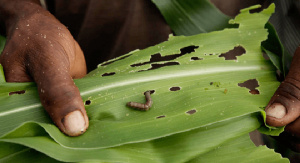Sale Of Wildlife Booms As Residents Defy Ban

Bushmeat lovers are still enjoying the delicacy in spite of a ban on the hunting and capturing of wildlife in the country until December 1.
The practice continues unabated and traders in the Eastern Region continue to line up on the Suhum-Kumasi road to sell their kill.
The Wildlife Division of the Forestry Commission of Ghana in August 2020, placed a ban on the hunting of animals.
The five-month-long ban also known as the “Close Season” was expected to end on December 1, 2020.
The ban is among the measures adopted to curb the decline of wildlife resource in the country and ensuring sustainable use of the resource while at the same time serving as a respite for the animal during their breeding period.
The law
The ban is in line with the Wildlife Conservation Regulation 1971, L.I. 685.
But a drive along the popular highway and one will find young men proudly displaying captured animals either dead or alive.
On sale are pangolins, squirrels and antelopes.
Under the law regulating wildlife in Ghana, any person who contravenes the regulation would be guilty of an offence and liable on summary conviction to a fine.
During this period, it is illegal for anybody to hunt, capture or destroy any wild animal except the grass cutter (Akrantie), which can be done only under a licence issued by the Wildlife Division of the Forestry Commission
But with two months to the end of the ban, it is business as usual for people along the Accra-Kumasi Highway who trade in wildlife.
Declining resources
The Executive Director of the Wildlife Division, Bernard Asamoah Boateng, explained that the five-month ban is part of measures to curb the decline of wildlife resources in the country and offer respite for the animals during their breeding period.
“This is the time science has shown that most of the animals are either pregnant or they have just delivered and are following their parents. So if you kill the parents, it means the young ones will die. If you kill the pregnant one, it means you have destroyed not one animal, but probably it was carrying triplets.
“Just as no one will destroy their goat, sheep, or cow when it is pregnant, the same way we don’t need to destroy the pregnant wildlife. We don’t need to destroy the wildlife that is taking care of its baby,” Mr. Asamoah Boateng said.
Residents selling pangolins along the Accra-Kumasi Highway
Some of the games are sometimes smoked dry, while others are sold immediately they are captured in the forests.
Theghanareport.com can confirm that this directive has been disregarded as many youngmen continue to hunt wildlife and sell along the highways on the Accra-Kumasi stretch.
On October 3, 2020, between Akyem Nsuwa and Osino on the Accra-Kumasi Highway, there was a display of different kinds of animals being sold.
The locals held the wildlife animals along the highway and flashed them in the sight of travellers on the road ostensibly to attract buyers.
Wildlife Division to intensify surveillance
Speaking to theghanareport.com on the disregard for the close season, the Executive Director of the Wildlife Division, Bernard Asamoah Boateng, said his office will intensify surveillance along the highways to apprehend persons engaged in the practice.
While explaining that his outfit has a patrol team that monitors the various roads to check for persons engaged in the bushmeat trading, he expressed worry over the blatant defiance of the close season.
“Kumasi-Nkawkaw is one of the major roads where we have a lot of people selling bushmeat and we’ve been patrolling on that road often…
“It’s unfortunate people are not law-abiding when it comes to the trade in bushmeat, but we will continue to do our best. We will continue to ensure that the ban is enforced and people keep to the ban,” Mr Asamoah Boateng told theghanareport.com in an interview Tuesday.
He further revealed that the Division had so far arrested some persons in Damango in the Savannah Region and Atebubu.
Mr Asamoah Boateng assured his outfit will continue to engage persons in communities that are notorious for trading in bushmeat.
By Theghanareport.com





